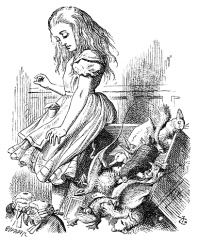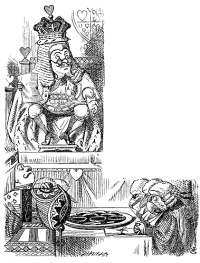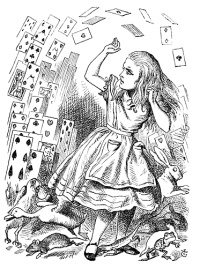Alice's Evidence
Studies in Alice XII, by Marc Edmund Jones This lesson considers the twelfth chapter of Alice in
Wonderland and the twelfth great principle of
wisdom in the Philosophy of Concepts as revealed
through the adventures of Alice is that all individual
acts are community responsibility. If this were not
so there would be no necessity for men to draw
together in a social state, and were this grouping of
humanity unnecessary it would be possible for each
individual to evolve as a unit by himself and
independently of anything outside himself and
therefore the whole of manifest creation would
become a joke. Here is where the average occult
theorist wanders astray and leaves the path of
common sense. Probably there is nothing more
simple to demonstrate than the fundamental
economy of nature, for even in her prodigality the
cosmic mother of all will be found eternally
conserving herself. Energy is indestructible as is
matter and the scientist only needs to take a large
enough field for observation to discover that absolutely nothing is wasted or thrown away in the
universal scheme of things. Science is proving rapidly that activity is but an interchange of
activities and in philosophy minds bent to research are learning that human manifestation is an
interchange of human relations. Utilization of mineral matter, vegetable life and animal form by
man would be idle if a result of this pyramiding of evolutionary dimension did not make possible
an exchange of activities in a larger sphere. Man lacks embodiment in these lower principles
when out of incarnation and hence cannot truly form any association with other disembodied
human entities. He dwells amid phantasms born of existence that he has gained while incarnate.
Thus a spirit can report an astral existence only as a distortion of physical being. That a man
dreams of another man indicates only in extreme instances that the other man actually shared this
experience. The community or body of incarnate relationships supports the general
consciousness in which the individual has his being and any individual act is founded on this
general or supporting social consciousness. Crime which is the subject of this lesson can be
defined therefore as misdirected individuality or unsocial sociality.
This lesson considers the twelfth chapter of Alice in
Wonderland and the twelfth great principle of
wisdom in the Philosophy of Concepts as revealed
through the adventures of Alice is that all individual
acts are community responsibility. If this were not
so there would be no necessity for men to draw
together in a social state, and were this grouping of
humanity unnecessary it would be possible for each
individual to evolve as a unit by himself and
independently of anything outside himself and
therefore the whole of manifest creation would
become a joke. Here is where the average occult
theorist wanders astray and leaves the path of
common sense. Probably there is nothing more
simple to demonstrate than the fundamental
economy of nature, for even in her prodigality the
cosmic mother of all will be found eternally
conserving herself. Energy is indestructible as is
matter and the scientist only needs to take a large
enough field for observation to discover that absolutely nothing is wasted or thrown away in the
universal scheme of things. Science is proving rapidly that activity is but an interchange of
activities and in philosophy minds bent to research are learning that human manifestation is an
interchange of human relations. Utilization of mineral matter, vegetable life and animal form by
man would be idle if a result of this pyramiding of evolutionary dimension did not make possible
an exchange of activities in a larger sphere. Man lacks embodiment in these lower principles
when out of incarnation and hence cannot truly form any association with other disembodied
human entities. He dwells amid phantasms born of existence that he has gained while incarnate.
Thus a spirit can report an astral existence only as a distortion of physical being. That a man
dreams of another man indicates only in extreme instances that the other man actually shared this
experience. The community or body of incarnate relationships supports the general
consciousness in which the individual has his being and any individual act is founded on this
general or supporting social consciousness. Crime which is the subject of this lesson can be
defined therefore as misdirected individuality or unsocial sociality.
 Here is the principle of guilt or the measure
of the unsocial distortion produced in the
social state. Conduct is so generally
considered in its conformity or lack of
conformity to the man-made rules and
regulations of society that the real principles
involved are buried under an avalanche of
complications. Misdemeanor is wholly
social in nature because it is supported by the
general consciousness. The mother who
cautions her children not to put beans up
their noses only establishes a general
consciousness to support that very act and
they promptly proceed to try it. Conduct as
a fundamental phenomenon is an activity of
man in reflex action with and volitional
action against community consciousness.
Thus if an individual marries a woman or
conforms to an idea or form of conduct, he
may indulge in an act that is unsocial when
indulged freely. The fact that procreative
instinct is natural is nothing in point. Free
love communities inevitably go to pieces
because whatever supports the general
consciousness needs no such support and
there is no sense of group responsibility
exacted from the individual. Puritan
settlements demonstrate much more virility
despite the falseness of their social ideals because of this strong sense of group being.
Here is the principle of guilt or the measure
of the unsocial distortion produced in the
social state. Conduct is so generally
considered in its conformity or lack of
conformity to the man-made rules and
regulations of society that the real principles
involved are buried under an avalanche of
complications. Misdemeanor is wholly
social in nature because it is supported by the
general consciousness. The mother who
cautions her children not to put beans up
their noses only establishes a general
consciousness to support that very act and
they promptly proceed to try it. Conduct as
a fundamental phenomenon is an activity of
man in reflex action with and volitional
action against community consciousness.
Thus if an individual marries a woman or
conforms to an idea or form of conduct, he
may indulge in an act that is unsocial when
indulged freely. The fact that procreative
instinct is natural is nothing in point. Free
love communities inevitably go to pieces
because whatever supports the general
consciousness needs no such support and
there is no sense of group responsibility
exacted from the individual. Puritan
settlements demonstrate much more virility
despite the falseness of their social ideals because of this strong sense of group being.
 The symbolism of the twelfth chapter of Alice
is interesting therefore in the climax with the
shower of playing cards about the young
lady's head. A superficial or false aspect is
given to everything by mood because each
mood is a direct contribution to community
consciousness or a larger supporting mood.
Indeed mood represents bondage to the social
state just as individualistic action indicates
release from this bondage in some given part
of being. Thus individualistic dreams are
more natural and unrestrained than waking
reality and the alternating waking and
sleeping of spirit in matter gives the balance
in perception that enables man to profit from
his social situation in life. When Alice has
evolved to the point where she recognizes
clearly the place of everything in this
underground world and begins to challenge
her environment and to assume control of it or
to grow in stature she wakes suddenly and
finds herself in a larger community. This is
not another world. It is a greater appreciation
of manifest spirituality in this world as in an evolution from prominence in a small town to
prominence in a big city to which the smaller success has led.
The symbolism of the twelfth chapter of Alice
is interesting therefore in the climax with the
shower of playing cards about the young
lady's head. A superficial or false aspect is
given to everything by mood because each
mood is a direct contribution to community
consciousness or a larger supporting mood.
Indeed mood represents bondage to the social
state just as individualistic action indicates
release from this bondage in some given part
of being. Thus individualistic dreams are
more natural and unrestrained than waking
reality and the alternating waking and
sleeping of spirit in matter gives the balance
in perception that enables man to profit from
his social situation in life. When Alice has
evolved to the point where she recognizes
clearly the place of everything in this
underground world and begins to challenge
her environment and to assume control of it or
to grow in stature she wakes suddenly and
finds herself in a larger community. This is
not another world. It is a greater appreciation
of manifest spirituality in this world as in an evolution from prominence in a small town to
prominence in a big city to which the smaller success has led.
The achievement of imagination in the chapter, or the twelfth great scientific anticipation, is the revelation of the principles of horticulture and of the control of species. The same principles operate in the animal and human kingdoms, but more individually and less as community manifestation. In sporting and mutation or the manifestation of new and variant types the vegetable world gives splendid illustration of the laws of community. Contrary to public opinion the feat in horticulture is not the development of new types but rather the persuading of types and species to stay fixed and uniform. This is the triumph of domestication. Ordinarily the plants and various members of the vegetable kingdom cannot be prevented from sporting or sending off new types and this is characteristic of normal community life. Civilization is not the forceful restraining of human mutation but rather the persuading of individuals to accept co-operative domestication. Therefore, the urge to sport must be gratified, as when there is too much restraint there is a breaking out of individuality that all too often manifests a crime.
The symbolism of the spilled jury box is excellent in showing the necessity for the community or underlying orderliness to permit a constructive development of individuality. When Alice rises the swish of her skirts spills the little animals and all too hasty attempts at self-expression or disordered attempts at self-establishment upset the community consciousness and lead to delay. Each juryman of life or each factor of understanding must be placed properly before things can proceed. Orderly arrangement of all factors permits a real mutation. Therefore the more prominent or individual man becomes the more conventional he must be in small and trivial things.
The law of applied psychology, or the twelfth big idea for the solution of personal problems, is brought out here in the technique of comprehension. From the nonsense verse the student gains a real charm and from the seemingly idle badinage of life the same delight is found. Games and all sports of consciousness give exercise to comprehension. Too often men are inclined to worship words and the outer or superficial form of things. All facts add to suspicion in consciousness if suspicion is there already. Thus in the case of the luckless knave the fact that he couldn't swim was irrelevant but suspicious. If the note was not in his handwriting, well, he had disguised it and that was more suspicious. The lack of signature was even more suspicious and so on. The king twists everything to fit the knave, and the community supposedly twists everything to fit the mood or attitude of the individual. The student must learn to TRANSCEND FACTS. He must learn that attitude is the controlling factor in mood and that mood controls the implication of facts. He must, within himself, rise above the outer.

Sabian.org





